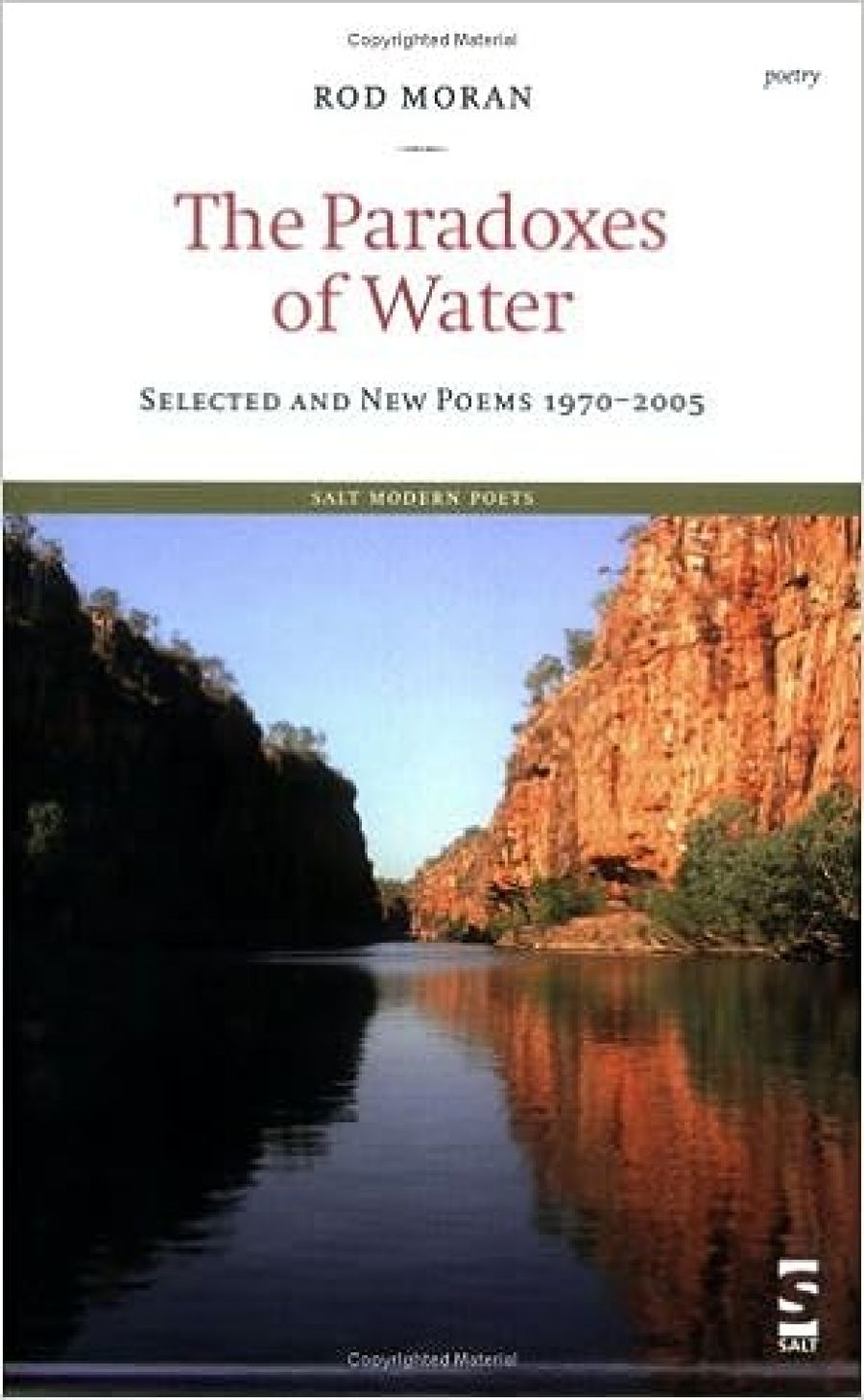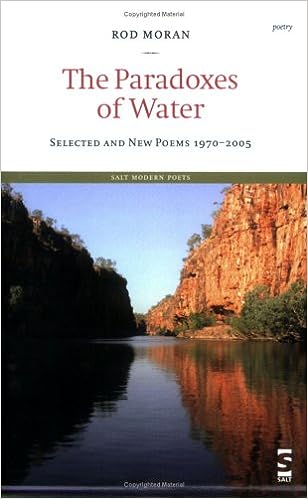
- Free Article: No
- Contents Category: Poetry
- Review Article: Yes
- Article Title: Cruel psalm
- Online Only: No
- Custom Highlight Text:
One of the things Rod Moran is good at is an oxymoronic tenacity – a kind of deliberate insouciance, a restrained violence – due to his embrace of metaphor. His best poems articulate disturbing comparisons and create surreal hybrids. You can see this in some of the early poems from High Rise Sniper (1970–80) selected for this new collection, such as ‘Chemical Worker’: ‘this pure acid, like some cruel psalm, / gives us daily bread ... [the living] / have a place in the maggot’s equation.’ Or, from ‘Cross Country’: ‘half a galah flock/ is spattered in its own pink / feathers and gore in mad array, / swimming down the highway / like grotesque fish / in the heat’s bright lagoon.’ The poems have an intensity that demands considerable attention and makes every line count.
- Book 1 Title: The Paradoxes of Water
- Book 1 Subtitle: Selected and new poems 1970–2005
- Book 1 Biblio: Salt, $29.95 pb, 125 pp
- Book 1 Cover Small (400 x 600):

In the twenty-five pages of New Poems, this density is only achieved in the superbly Chagallian ‘Goat Killing’, eight terse (pairs of) unrhymed couplets: ‘The white goats in their stony field / look suitably Biblical, / ready to be trussed, their throats / ruptured into warm red grins / ... [the slaughterman’s] smile is a dedicated blade, / flashing through the flesh of words.’ The writing is vivid and casual, comic and grim. ‘The Paradoxes of Water’ is a clever meditation on the mysterious qualities of water (‘Water can conjure fish from dust, / a stunned frog from beneath gibber’), but it lacks tension, like the earlier ‘Wire’ and ‘Ways of Laughing’.
In the main, Moran’s poetry interrogates messy events and discourses of history and politics. In ‘Kampuchea’, Moran uses Breugel’s Massacre of the innocents as a frame to explore this other killing and to wonder (a central concern of his poetry): ‘How to assert love against such negations / … Art cannot push the boundaries of suffering back; / it can only record the dark beasts living, / prophesy the burnt jungle’s return.’ I think Moran understates his own poetry’s fascination with the inevitability of pain – in both the natural and the human world.
Consider ‘Bass Strait Poems’, where nature is cruel and mankind crueller. Moran slates George Augustus Robinson’s efforts to save the Tasmanian Aborigines from extinction. He is an ‘instrument of God’s love’ and the settlement ‘a bucolic Belsen’. In the sonnet ‘Staffroom’, he satirises education: ‘Ideas are / like grains of dirt on perished wood.’ In ‘Travelling’: ‘I prayed the rabbits / thumping wet against the chassis / would not disturb your sleep. / I heard them squeal blood above the engine’s scream.’ And even the kelp farmers ‘worship the gales / that rip the kelp from deep under’. This is more than mere documentation: it is hallucinatory, elegiac.
The Lazarus Poems (1990) wryly looks back at key moments in Western culture from a ghostly, sceptical perspective. In ‘Lazarus and the Hiroshima Incident’, discomfortingly: ‘the florid flesh of infants dissolving / like anemones on a summer beach.’ In ‘Lazarus Considers the Gulag’, there is a more subtly ironic beauty: ‘Their veins ached with permafrost / the impossible distance a serration of firs.’
The best poems in this new collection are, I think, from Listening to the Train Passing (1988–94). For example, ‘Aldo the Limeburner’: ‘Aldo’s eyes are crimson at their rims, / like small salt-pans seen from a plane / … The iced beer his dusty wife delivers / flushes his gums like cold acetylene’; and ‘An Effect of Black Cockatoos’: ‘Their screeching is a zinc nail / scraped across the day’s glassy blue / … their corrugated voices / … a gravel of lunar noise.’ Most impressive of all are The Yanchep Bonfire Raves. Moran has found a conversational fluidity that conjures writers, musicians, performers in a kind of postmodern Punch and Judy show where Moran thinks and writes about the meaning and function of art in terms of human experience.
In Raves, Moran focuses on, among other subjects, the mysterious night Glenn Miller died: ‘moonlight … / flooded the cockpit like a wizard’s breath, / the small craft a double-bass flung at the sky’: death is random, unsoftened by religion, art or politics. ‘Raving to Kevin Murray about his Letters’ meditates on the construction of beauty by free association: ‘experimenting to see if wine / would absorb the [frangipani’s] exquisite fume’ to explore ‘the things we/you do for beauty’. And in ‘Rave about Nature and Human Artefacts’, Moran explores the significance of an epigraph from Eugenio Montale he used in Against the Era (1982–88): ‘The subject … of every possible form of poetry is the human condition.’ These are dramatic monologues that engage by holding the reader in a mesmeric verbal prestidigitation.
Moran’s poetry is rarely lyrical; when it moves in that direction, it strains towards lushness, as in ‘A Lyric on the Natural History of Our Love’, or whimsicality, as in ‘My Daughter Reading’. His is not a poetry of the personal, and words such as ‘grammar’ or ‘paradox’ are burdened with significance and gravitas. The poet’s voice can become a tad portentous, insisting on its cleverness as in ‘A Homage to the Elephant’ and ‘from Letters from the Metro’.
Nevertheless, The Paradoxes of Water is an impressive collection and includes fine, brief, conceptual poems such as ‘Forensic Triptych’, the ghastly ‘Detention’ and pristine haikus such as ‘Construction Site’: ‘The scaffolding looms. / Later, riveted with stars, / a steel arch of sky.’ Salt Publishing is to be congratulated on an elegant and arresting volume.


Comments powered by CComment